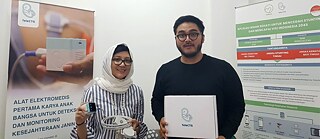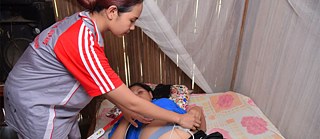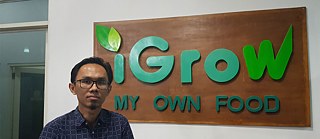SEHATI TELECTG AND IGROW
Startups Harness Technology for Social Impact

Founded on the global goals of achieving the well-being of mothers and children and ensuring food security, the two startups Sehati TeleCTG and iGrow shared their views about supporting Indonesia to meet the UN’s Sustainable Development Goals (SDGs) by 2030.
Indonesia, an archipelago with 260 million people, has committed to attaining the SDGs by 2030. SDGs are universal goals agreed upon by 193 countries in September 2015 at the United Nations to end poverty and hunger, to eliminate inequalities, and to ensure health for all ages.
Like other countries, developing countries such as Indonesia have the obligation to achieve the 17 goals and 169 targets listed in the SDGs to create a more sustainable future for all.
The Indonesian government has shown strong commitment to the implementation of the SDGs, as evidenced by Presidential Decree No. 59/2017 issued by President Jokowi. Among other things, it mandates the National Development Planning Agency (Bappenas) to prepare a clear roadmap for SDGs.
The global goals, however, cannot be achieved solely by relying on government efforts. Fortunately, many Indonesian entrepreneurs have founded startups, not merely to earn profits but also to create social impact intended to help the country to gradually achieve the SDGs.
Sehati TeleCTG provides health solutions through technology
One of the tech startups founded with the mission to reduce mortality rates of mothers and children is Sehati TeleCTG. The idea to create Sehati TeleCTG was initiated by two experts in the field of medicine: Anda Sapardan, who had worked in the medical industry for 12 years, and her husband Dr. Adi Waluyo, an obstetrician-gynecologist (OB-GYN). Along the way they met young technology experts Abraham Auzan, Rizky Rakhmat Oentoe, and the business professional Endang Sri M. Ratiyo. They combined their expertise and founded Sehati TeleCTG in 2016.
To improve the quality of life for the next generations in Indonesia, the founders created a mobile application called Sehati to assist expecting mothers throughout their pregnancy by providing tips and guidance designed to improve the health of newborns. The app can also be used by midwives to facilitate prevention of maternal and infant mortality and morbidity through early detection of risk factors and is useful in preventing stunting from the very beginning.
“Factors that can increase the risk of death for mother and child are late detection and late referral. Thus, [with Sehati], these risk factors can be prevented early,” explains Anda Sapardan, CEO and co-founder of Sehati TeleCTG.
Stunting—a key indicator of overall child welfare—has become a major problem in Indonesia. Stunting is the impaired growth and development of children caused by chronic undernutrition, infections, or diseases.
Basic Health Research (Riskesdas) data in 2018 issued by the Health Ministry found stunting in Indonesia affected 30.8% of children under five years old. Although the figure plunged from 37.2% in 2013, it was still far from the World Health Organization’s target of 20%. Stunted children tend to grow up to be economically disadvantaged because they fall sick regularly and many of them miss the chance to learn and pursue higher education.
The elimination of stunting is a key task in Indonesia to ensure it can achieve the SDGs concerned with ending poverty while promoting good health and the well-being of its citizens. To help reduce stunting, the startup company also created a low-cost cardiotocograph called TeleCTG that helps midwives in remote areas measure maternal and fetal health.
“We conducted a pilot project in Kupang and the results were amazing. We are able to identify which mothers have anemia and help them to ensure a better quality of pregnancy,” says Abraham Auzan, CPO and co-founder of Sehati TeleCTG.
TeleCTG medical devices are now ready to be distributed to hospitals and health centers across Indonesia. Each device costs Rp 20–25 million, which is much cheaper compared to the conventional cardiotocograph costing Rp 100-150 million. As part of its effort to boost social impact on the community, Sehati TeleCTG also educates midwives by providing online training once a week through WhatsApp and Telegram. According to Abraham, over 38,000 midwives have joined the online groups so far.
iGrow improves farmers’ welfare
iGrow is an agricultural peer-to-peer lending platform that enables ordinary citizens to fund local farmers. Its vision for Indonesia is ambitious: to ensure food security. Andreas Senjaya, Muhaimin Iqbal, and Jim Oklahoma were trying to address three problems experienced by many Indonesian farmers: lack of market access, inadequate skills, and access to capital. After being able to identify the problems, in 2014 they decided to create an agricultural startup called iGrow. Its long-term goal was to create social impact by helping the country attain food security.
Jim Oklahoma, iGrow’s co-founder and chief business development officer, explained that iGrow not only helps farmers to find markets to sell their crops but also increases farmers’ skills and raises funds from the lenders. “After we upgrade farmers’ skills, lenders will no longer hesitate to lend to farmers. At present, only about 2% of bank loans are disbursed to the agriculture sector,” he said.
The improvement in the country’s agriculture sector will contribute significantly to the achievement of the SDGs, including the eradication of poverty and hunger. The main income for the majority of poor people in rural areas today comes from the agriculture sector. iGrow takes part in improving Indonesia’s agriculture system so that in the future the country will be able to attain food self-sufficiency by not having to import foods such as rice, shallots, corn etc. from other countries. iGrow maintains that it has been able to improve the quality of life for farmers. Currently, iGrow has collaborated with 7,500 farmers via 35 entities such as cooperatives, CVs, and PTs. iGrow manages farmers in various locations around Indonesia, including Java, Bangka, Sulawesi and Bali.
“A farmer generally earns Rp 50,000 per day, but after joining iGrow, they can earn as much as Rp 75,000 – Rp 150,000 per day,” claims Jim Oklahoma.
Further, iGrow also educates and upgrades the skills of farmers at an informal iGrow boarding school in Jonggol, West Java. In the near future, iGrow will require farmers that join iGrow to earn special certification before they are able to be funded by lenders.